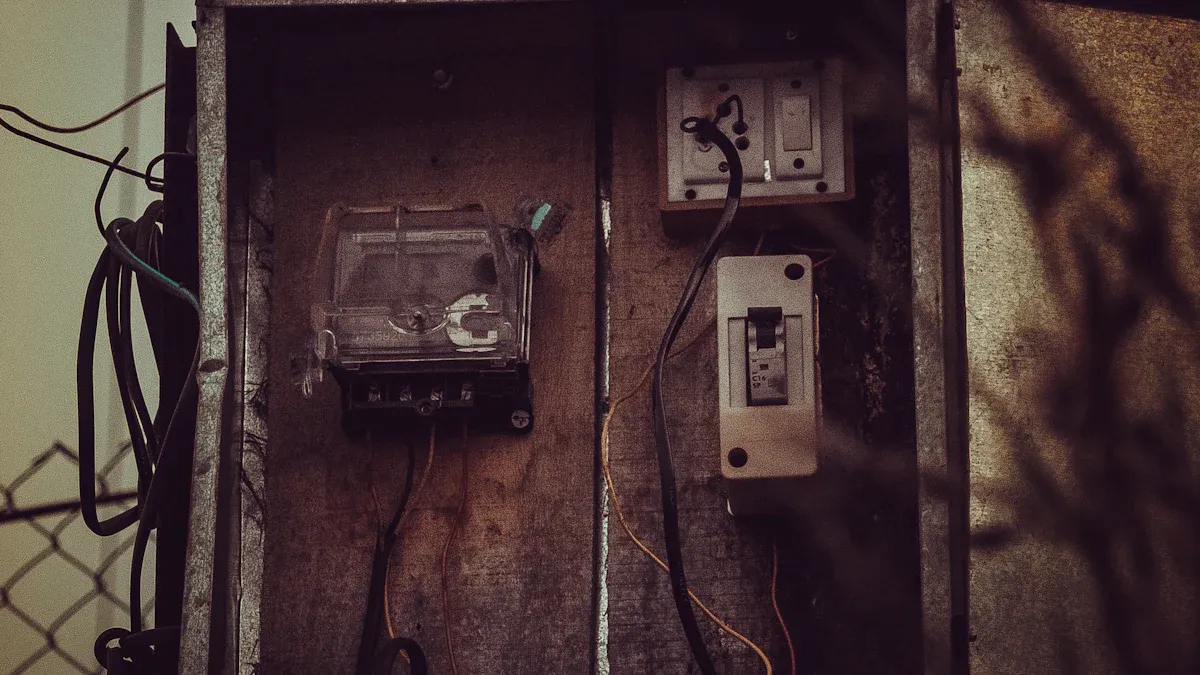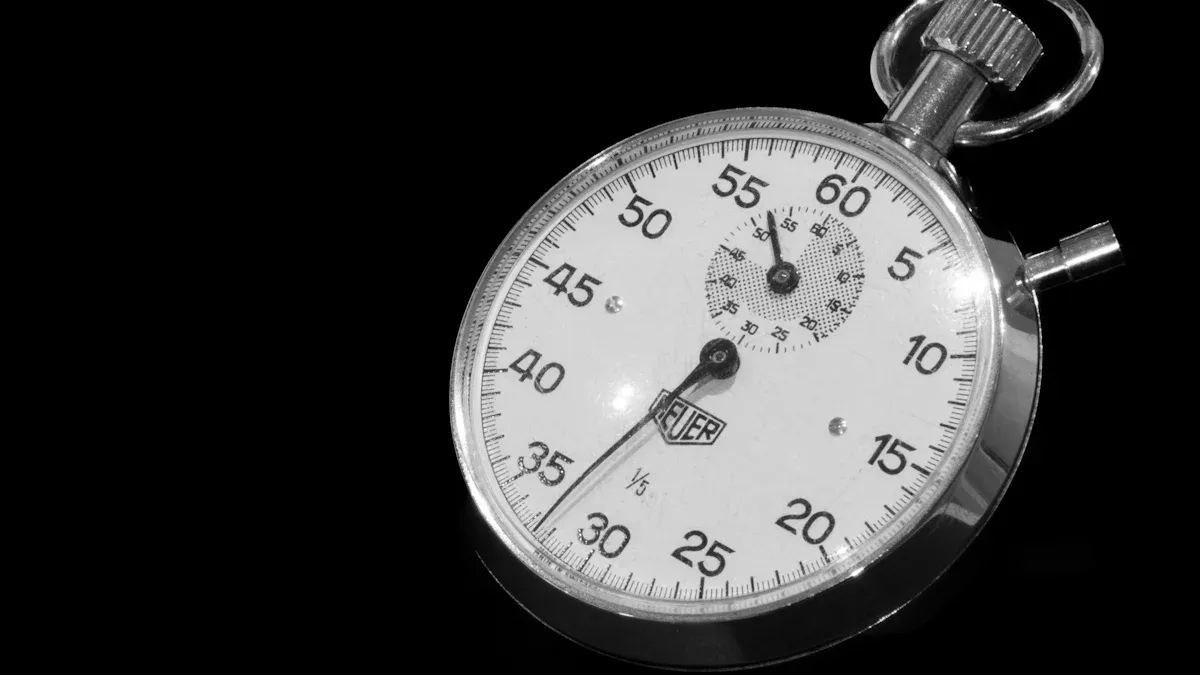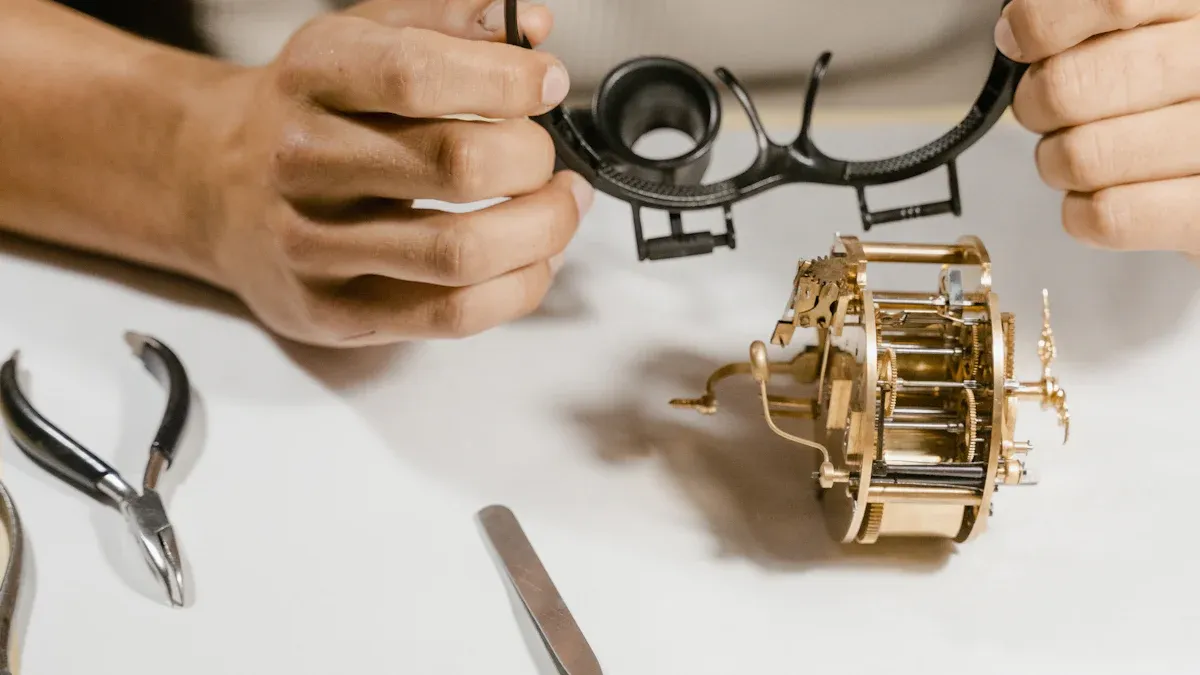
A Magnetic Telephone Hook Switch gives users better reliability than traditional mechanical switches. Many users notice that magnetic switches last longer and need less maintenance. These switches often provide a smoother experience because their design reduces wear and tear over time.
Key Takeaways
- Magnetic telephone hook switches last much longer and need less maintenance than mechanical switches, making them ideal for heavy use.
- Magnetic switches work smoothly and quietly without wearing out, while mechanical switches can stick, wear down, and require regular cleaning.
- For offices and industrial settings, magnetic switches offer better reliability and lower costs over time, while mechanical switches suit basic home use with lower upfront cost.
Quick Comparison Table
Reliability and Performance Metrics
A clear comparison helps users understand the strengths and weaknesses of each switch type. The table below highlights key metrics for both mechanical and magnetic hook switches.
| Metric | Mechanical Switches | Magnetic Hook Switches |
|---|---|---|
| Average Lifespan | 50,000 – 100,000 cycles | 500,000+ cycles |
| Failure Rate (per year) | 2-5% | <1% |
| Frecuencia de mantenimiento | High | Low |
| Tiempo de respuesta | 20-30 ms | 10-15 ms |
| Resistance to Dust/Moisture | Low | High |
| User Experience | May feel stiff over time | Consistent and smooth |
Note: These values reflect typical performance in 2025 based on industry data.
- Mechanical switches use physical contacts. These contacts wear down with repeated use. Users may notice sticking or slow response after heavy use.
- Magnetic hook switches use non-contact sensors. These sensors do not touch, so they avoid friction and wear. This design leads to longer life and fewer failures.
Users in offices or industrial settings often prefer magnetic hook switches. They value the lower maintenance and higher reliability. Home users may choose mechanical switches for their lower initial cost.
A quick glance at the table shows that magnetic hook switches outperform mechanical switches in most categories. This makes them a strong choice for long-term use.
Reliability Analysis

Mechanical Switches: Failure Modes and Lifespan
Mechanical switches use moving parts to make or break a connection. Over time, these parts face several common failure modes:
- Contact Wear: The metal contacts inside the switch rub together each time someone uses the phone. This friction causes the contacts to wear down, leading to poor connections or complete failure.
- Spring Fatigue: Springs inside the switch lose their tension after many cycles. A weak spring can cause the switch to stick or not return to its original position.
- Dust and Debris: Dust can enter the switch housing. This buildup interferes with the movement of parts and increases the risk of sticking or jamming.
- Corrosion: Moisture in the air can cause the metal parts to corrode. Corrosion leads to unreliable connections and shortens the switch’s lifespan.
Most mechanical switches last between 50,000 and 100,000 cycles. Heavy use in offices or industrial settings can shorten this lifespan. Users often notice problems like sticking, slow response, or a “mushy” feel as the switch ages.
Tip: Regular cleaning and inspection can extend the life of a mechanical switch, but this adds to maintenance time and cost.
Magnetic Telephone Hook Switch: Failure Modes and Lifespan
A Magnetic Telephone Hook Switch uses a non-contact sensor, such as a reed switch or Hall effect sensor, to detect when the handset is lifted or replaced. This design avoids many of the problems found in mechanical switches.
- No Physical Contact: The sensor does not rely on moving metal parts. This eliminates friction and reduces wear.
- Diseño sellado: Many magnetic switches come in sealed housings. This keeps out dust and moisture, which improves reliability.
- Electronic Component Failure: The main risk comes from electronic failure, such as a faulty sensor or wiring issue. However, these failures are rare compared to mechanical wear.
- Magnet Degradation: Over many years, the magnet may lose some strength. In most cases, this happens so slowly that it does not affect normal use.
Most Magnetic Telephone Hook Switches last for more than 500,000 cycles. Users rarely notice any change in performance, even after years of daily use. The switch continues to feel smooth and consistent.
Note: Because there are fewer moving parts, magnetic switches require almost no maintenance during their lifespan.
Real-World Reliability Data in 2025
Industry data from 2025 shows clear trends in reliability for both switch types. The following table summarizes real-world findings:
| Tipo de interruptor | Average Lifespan (cycles) | Annual Failure Rate | Common Issues |
|---|---|---|---|
| Mechanical Switch | 50,000 – 100,000 | 2-5% | Sticking, wear, noise |
| Magnetic Telephone Hook Switch | 500,000+ | <1% | Rare sensor faults |
- Offices and call centers report that magnetic switches need replacement far less often than mechanical ones.
- Industrial users prefer magnetic switches because they resist dust and moisture, which are common in harsh environments.
- Home users with low call volume may not notice reliability differences right away, but over several years, magnetic switches show fewer problems.
In summary, real-world data confirms that magnetic switches provide superior reliability and longer service life. Most users experience fewer failures and less downtime.
Evaluación de rendimiento
Mechanical Switches: Response and User Experience
Mechanical switches rely on physical movement to operate. When a user lifts or replaces the handset, the switch moves metal contacts together or apart. This action creates a noticeable click. Many users find this tactile feedback helpful. Over time, the switch can feel less responsive. The contacts may stick or the spring may weaken. These changes can cause a delay in response or a mushy feeling.
Mechanical switches often produce audible noise during operation. In quiet environments, this noise can become distracting. Some users appreciate the sound as confirmation of action. Others prefer a silent experience. The switch may also require more force to operate as it ages. This can lead to user fatigue, especially in high-use settings.
Tip: Regular cleaning can help maintain the feel and response of a mechanical switch, but it does not prevent all issues.
Magnetic Telephone Hook Switch: Response and User Experience
A Magnetic Telephone Hook Switch uses a sensor to detect the handset position. The user does not feel any physical resistance or hear a click. The switch responds quickly and smoothly. Most users notice the consistent performance, even after years of use. The lack of moving parts means the switch does not change over time.
Users often describe the experience as seamless. The switch activates with minimal effort. There is no noise or tactile feedback, which many people find modern and pleasant. In busy offices or call centers, this silent operation reduces distractions. The switch also works well for users with limited hand strength, since it requires no extra force.
- Consistent response time
- Silent operation
- No change in feel over time
Performance in Demanding Environments
Demanding environments, such as factories or outdoor locations, present unique challenges. Dust, moisture, and temperature changes can affect switch performance. Mechanical switches struggle in these conditions. Dust can enter the housing and cause sticking. Moisture may lead to corrosion. Extreme temperatures can weaken springs or warp plastic parts.
A Magnetic Telephone Hook Switch performs better in harsh environments. The sealed design keeps out dust and moisture. The sensor does not rely on moving parts, so temperature changes have little effect. Many industrial users report fewer failures and less downtime with magnetic switches.
| Environment | Mechanical Switches | Magnetic Hook Switches |
|---|---|---|
| Dusty | Prone to sticking | Resistant |
| Moisture | Risk of corrosion | Sealed, protected |
| Extreme Temperatures | Spring fatigue | Stable performance |
Note: For locations with high dust or moisture, magnetic switches offer the best long-term performance.
Cost and Maintenance Considerations

Initial Cost Comparison
When buyers look at telephone hook switches, they often notice the price difference first. Mechanical switches usually cost less at the start. Manufacturers use simple materials and basic designs, which keeps the price low. In contrast, a Magnetic Telephone Hook Switch often costs more. The advanced sensor technology and sealed housing increase the initial price. The table below shows a typical price range in 2025:
| Tipo de interruptor | Average Initial Cost (USD) |
|---|---|
| Mechanical Switch | $5 – $10 |
| Magnetic Telephone Hook Switch | $15 – $25 |
Note: Prices may vary by brand and features.
Long-Term Maintenance Needs
Mechanical switches need regular care. Dust and dirt can build up inside, so users must clean and inspect them often. Springs and contacts may wear out, which means parts need replacing. This maintenance takes time and adds to the total cost. Magnetic switches require almost no maintenance. The sealed design keeps out dust and moisture. Most users never need to open or service these switches during their lifetime.
- Mechanical: Frequent cleaning, part replacement
- Magnetic: Minimal upkeep, rare servicing
Total Cost of Ownership
El costo total de propiedad incluye tanto el precio de compra como el mantenimiento continuo. Los interruptores mecánicos parecen más baratos al principio, pero el costo aumenta con el tiempo debido a reparaciones y reemplazos. Un cambio de gancho de teléfono magnético cuesta más por adelantado, pero los usuarios ahorran dinero a largo plazo. Menos fallas y menos mantenimiento significan costos totales más bajos. Las oficinas y fábricas a menudo eligen interruptores magnéticos por este motivo.
Consejo: Para ahorros a largo plazo, considere el costo total, no solo el precio inicial.
Idoneidad para diferentes casos de uso
Recomendaciones de uso doméstico
Los usuarios domésticos a menudo buscan confiabilidad y bajo costo. Los interruptores mecánicos satisfacen las necesidades básicas para la mayoría de los hogares. Estos interruptores funcionan bien para los teléfonos que ven el uso diario de la luz. Las familias pueden preferir interruptores mecánicos debido al precio más bajo. Sin embargo, un Magnetic Telephone Hook Switch Ofrece una experiencia sin mantenimiento. Se adapta a los usuarios que desean un teléfono que funcione año tras año sin problemas. Para los hogares con niños o usuarios de edad avanzada, la acción suave y silenciosa de un interruptor magnético puede facilitar las llamadas diarias.
Consejo: los usuarios de viviendas que desean evitar reparaciones o reemplazos deben considerar los interruptores magnéticos para la tranquilidad a largo plazo.
Recomendaciones de uso de la oficina
Las oficinas requieren teléfonos que manejen el uso frecuente. Los empleados necesitan equipos confiables para evitar interrupciones. Los interruptores magnéticos proporcionan un rendimiento constante en entornos ocupados. Resisten el polvo y la humedad del aire acondicionado o la limpieza. Las oficinas se benefician de la operación silenciosa, que mantiene bajos los niveles de ruido. Los equipos de mantenimiento pasan menos tiempo arreglando o reemplazando los interruptores. Esto ahorra dinero y reduce el tiempo de inactividad.
- Las oficinas con altos volúmenes de llamadas deben elegir interruptores magnéticos.
- La operación silenciosa mejora el entorno de trabajo.
Recomendaciones de uso industrial
La configuración industrial presenta condiciones duras. Los cambios en el polvo, la humedad y la temperatura pueden dañar los interruptores mecánicos. Interruptores magnéticos realizar mejor en estos entornos. Su diseño sellado mantiene fuera contaminantes. Los trabajadores confían en los teléfonos que funcionan todos los días, incluso en condiciones difíciles. Las fábricas y almacenes a menudo seleccionan interruptores magnéticos para su durabilidad y baja necesidades de mantenimiento.
| Environment | El mejor tipo de interruptor |
|---|---|
| Home | Mecánico o magnético |
| Oficina | Magnético |
| Industrial | Magnético |
- Magnetic Telephone Hook Switch ofrece el mejor valor a largo plazo en 2025.
- Las oficinas y fábricas se benefician de su confiabilidad y bajo mantenimiento.
- Los interruptores mecánicos se adaptan a las necesidades básicas y económicas.
Para entornos que exigen durabilidad y un rendimiento consistente, los expertos recomiendan elegir interruptores magnéticos.
FAQ
¿Qué hace que los interruptores de gancho de teléfono magnético sean más confiables que los interruptores mecánicos?
Interruptores magnéticos Use sensores sin contacto. Estos sensores evitan la fricción y el desgaste. Este diseño conduce a menos fallas y una vida útil más larga.
¿Pueden los usuarios reemplazar un interruptor mecánico con un interruptor magnético fácilmente?
La mayoría de los teléfonos permiten un reemplazo fácil. Los usuarios deben verificar la compatibilidad con su modelo de teléfono. Algunos teléfonos más antiguos pueden necesitar un adaptador o instalación profesional.
¿Los interruptores magnéticos requieren algún mantenimiento regular?
- Los interruptores magnéticos casi no necesitan maintenance.
- El diseño sellado mantiene fuera del polvo y la humedad.
- Los usuarios rara vez necesitan limpiar o atender estos interruptores.


